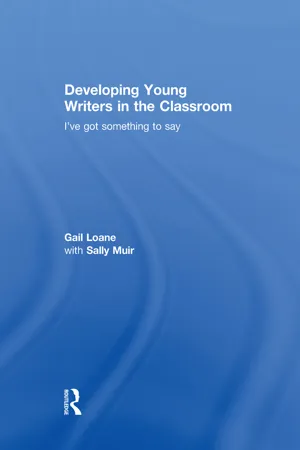
- 292 pages
- English
- ePUB (mobile friendly)
- Available on iOS & Android
About this book
Educators want young people to grow up knowing that writing is an important and deeply satisfying life skill, one that helps them make more sense of themselves and their world, and one that helps them to communicate effectively. Sadly, too often writing becomes merely an exercise in 'getting words right', or writing to teacher-prescribed tasks.
Developing Young Writers in the Classroom explores the principles of developing literacy through authorship, allowing children to describe, question and celebrate their own experiences and personal creativity. The book offers detailed guidance, supported by planning documents, poetry and prose, examples of children's work and stimulating visuals.
Inspiring topics explored include:
- creating a classroom environment which supports an independent writer
- students' lives brought into the classroom
- finding significance in our experiences
- the use of memoir for recording experiences
- description in all kinds of writing
- choosing and writing about a character
- writing in all curriculum areas
- linking reading and writing
- using other authors as mentors and teachers
- collaborative learning.
Illustrated throughout with accessible activities and ideas from literature and poetry, Developing Young Writers in the Classroom is an essential resource for all teachers wishing to inspire writing in the classroom.
Frequently asked questions
- Essential is ideal for learners and professionals who enjoy exploring a wide range of subjects. Access the Essential Library with 800,000+ trusted titles and best-sellers across business, personal growth, and the humanities. Includes unlimited reading time and Standard Read Aloud voice.
- Complete: Perfect for advanced learners and researchers needing full, unrestricted access. Unlock 1.4M+ books across hundreds of subjects, including academic and specialized titles. The Complete Plan also includes advanced features like Premium Read Aloud and Research Assistant.
Please note we cannot support devices running on iOS 13 and Android 7 or earlier. Learn more about using the app.
Information
Index
- A Land of Two Halves 115
- ‘A Special Stone’ 84
- ‘A Summer’s Day’ 84–5
- A Summery Saturday Morning 114
- Abbs, Peter 17, 144
- adjectival phrases 250, 253
- adjectives 164–6
- adverbial clauses and phrases 252–3
- Albany roosters 228–9
- ‘Alternating Current’ 213–14, 227
- Amis, Martin 49, 115
- Anderson, Jeff 261, 270–1
- anecdotes see common experiences, sharing
- Angela’s Ashes 88, 158
- Angelou, Maya 101–2, 118
- At the Bay 5–6
- Atwell, Nancie 44, 51, 54, 112
- authors, learning from 7–8 see also model texts
- autobiographies 101, 103
- autumn, importance of observation 149–50
- Baars, Margo 115
- background information,use in memoir 116–17
- Baxter, James K. 107–8, 121–3
- ‘Beans’ 58–60, 64–8, 75, 90, 169
- behaviour, character portrait 191–2
- beliefs, teacher 1–3
- Bennett, Joe 115
- Bernen, Robert 143
- Betjeman, John 160
- ‘Between Earth and Sky’ 79
- Bishop, Gavin 30, 88, 112, 124, 126, 249–52, 273–5
- Bleak House 170–1
- Boyle, Stan 137
- Bradley, Jan 55
- Britton, James 61
- Brooke, Rupert 131–3
- Browne, Anthony 225
- Brownlee, Pennie 173
- Buckner, Aimee 45
- Calkins, Lucy 44–5, 46, 50, 61, 107, 248, 282, 283
- character portrait 40, 179–209; behaviour 190–2; choosing a character 184; effect on others 198–9; environment and belongings 199–200; framework for 183; guided revision 190...
Table of contents
- Cover
- Halft Title
- Title Page
- Copyright Page
- Table of Contents
- Foreword
- Introduction
- Lesson Plans
- Acknowledgements
- The Teacher of Writing: Becoming joyfully literate
- The Writing Classroom: Conditions for writers to flourish
- From the Head to the Page: Getting it down
- Personal Expressive Writing: I’ve got something to say
- Tapping into Universal Experiences: Nurturing awareness
- Memoir: The polished lens of memory
- Observing and Noticing: Describing what we see
- Inside or Outside: Describing the place
- Character Portrait: Describing people
- Writing across the Curriculum: Writing to learn and writing to share our learning
- Using Models: Where texts might lead us
- Nurturing our Teaching: Fostering our own literacy
- References
- Index